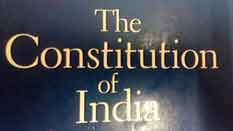Case Comment On Vineeta Sharma v/s Rakesh Sharma
The Vineeta Sharma v. Rakesh Sharma[1] case revolves around the concept of the coparcenary rights of the daughter and the Hindu Succession Act. Before the
ancient Mitakshara Law of Hindu was followed by the Hindu Succession in the vast
regions of India excluding some regions of West Bengal and Assam, The Hindu
Succession Act[2] was enacted in the year 1956. The devolution of the property
after the Hindu male demise and following the rule of survivorship for the same
purpose was mentioned in section 6 of the Hindu Succession Act, 1956[3].
Initially, daughters by birth had neither coparcenary rights to directly inherit the father's property nor the right to inherit the ancestral property of the joint Hindu family. The amendment act, of 2005, was passed with the main motive to furnish equality. This act brought the right to coparcenary for the daughters from their birth. This provided the daughter to have the equal rights as the sons have from their birth, by virtue of the 2005 Amendment to the Hindu Succession Act's replaced Section 6.
The legislation amendment was made in a fair intention, trying to erase the negative effects of past discrimination. However, the legislation at some point lacks in its applicability or enactment.
This has sparked various concerns such as:
Background of the case:
The Hindu Succession (Amendment) Act, 2005[4] was enacted on 9 November 2005 to further amend the Hindu Succession Act 1956, giving coparcenary rights to daughters by birth as same as that of sons under Section 6 (1) (a) of the Hindu Succession Act, 1956 mentioning that the daughter of a coparcener shall by birth become a coparcener in her own right in the same manner as the son.
The question was: Can the coparcenary rights be claimed by the daughters born before 2005?
Another question that arose was that is it mandatory or required to have the daughter and the father both alive on 9 November 2005 in order to effectuate the provisions of the amended section or not.
The Honorable Supreme Court attempted such questions and answered in the following cases:
Prakash & others v. Phulvati & others[5]:
The Supreme Court held that the nature of the Amendment Act 2005 is not of a retrospective nature but of a prospective nature, similarly, the rights granted to the daughter under section 6 of the Amendment Act 2005, is applicable to the living daughter of a living coparcener to be alive as on 9 November 2005 to permit the daughter to claim rights over the property of the coparcener.
In this case, the coparcener has died before the 2005 amendment and therefore, it was held by the apex court the daughter is not entitled to claim the property of the coparcener because she is not a daughter of a living coparcener.
Danamma @ Suman Surpur v. Amar[6]
In this case, the court has not specifically dealt with the concept of a living daughter of a living coparcener.
The court took a different stance from that in the Phulavati case mentioned above and held that daughters have equal rights in the coparcenary property as that of sons, even though the coparcener had passed away before the amendment of 2005.
From the observation of the above-mentioned cases, an appeal was made to the Supreme Court in Vineeta Sharma v. Rakesh Sharma, raising similar questions before the Honorable Supreme Court and bearing in mind the decision of the above-mentioned cases namely Phulavati and Danamma Case. Considering the contradicting decisions in the above-mentioned cases the issue was referred to a larger bench constituting three Judges of the Honorable Supreme Court.
Issues Before the Honorable Supreme Court:
Arguments made by the Solicitor General of India on behalf of the Union of India
Appearing on behalf of the Union of India, Shri Tushar Mehta made reasons that were consistent with the verdict itself. He maintained that real partitions completed before December 20, 2004, when the Rajya Sabha announced the amendment bill, should not be challenged since doing so would harm the legal position. Since the death of the coparcener/father does not always mean the end of coparcenary-which may continue with other coparceners living-the Solicitor General acknowledged that a coparcener's father need not be alive during the amendment act for a daughter to enjoy coparcenary rights.
Arguments contented by the learned Senior Counsel and Amicus Curiae, Mr. R. Venkataramani
According to Shri R. Venkataramani, who contended as an amicus curiae, both of the prior rulings found that the clauses are of a future character, hence there is no inconsistency between these rulings. He argued that the Amendment Act, not the fact that she was born, is the only reason why a daughter is treated equally to a boy in terms of coparcenary rights.
If the father/coparcener is no longer alive, the daughter will not inherit the remaining coparcenary stake.
His arguments state that if the law is applied to the daughter as if she were a co-defendant prior to September 9, 2005, there will be a great deal of doubt. He claims that the parliament's objective is to move toward the future and that it has no desire to revisit the past or scramble an uncooked egg.
According to Shri V.V.S. Rao, an amicus curia, the future perfect tense and plain language have equal rights, and phrases like "on and from" in section 6(1) of the Hindu Succession Act, 1956[7] and "become," "have," and "be" show that the parliament intended to apply the Amendment Act's provisions prospectively rather than retrospectively.
A daughter to become the coparcener, it is not required that a daughter be born before 2005, i.e., a daughter born before or after 2005, can be considered as a coparcener. He further contended that the coparcener or the father should be alive as on 9th November 2005, as if in any case the coparcenary is being disrupted by either the act of a party or the death of any one or more parties, then there will be no coparcenary property, that can be inherited by the daughter.
The Position of the Law cannot be altered because the status deliberated cannot disturb the past transaction of alienation, disposition, and partition either in oral or written. Therefore, according to him, there should be a living coparcener in order to entitle the daughter to inherit and become a coparcener.
On behalf of the Respondent, Shri Sridhar Potraju contended that if a division had actually occurred, it should be acknowledged. He argued that a preliminary order should be regarded as final since it indicates that the Hindu family's jointness has terminated with the simple filing of the complaint for division.
He argued and reaffirmed that the provisions are intended to be prospective in nature because such interpretation is not desired, which would take away the crystallized rights of the surviving coparcener and, as a result, result in settled issues being unsettled. Using Uppaluri Hari Narayana & Ors.[8] as a foundation. He emphasized that because the rules are not retroactive, liabilities may only be passed to the daughter as of the modification date.
The aim and goal of the Amendment Act, which is to eliminate the discrepancy between sons and daughters, would be defeated, according to Shri Amit Pai and Shri Sameer Shrivastav, if both the coparcener and the daughter were still living after the Amendment Act's implementation.
They maintained that coparceny only occurs after birth and that adoption is the only circumstance in which it occurs. They do, however, agree that if a partition is really implemented, the daughter should not request a division of the property that has already been split.
Judgment
In this case, the Supreme Court's Bench referred to the several principles of Hindu Law, both codified and customary for instance Coparcenary and Joint Hindu family, unobstructed and obstructed heritage along with catena of Judgments. After examining these things, the court observed that joint Hindu Family property is an unobstructed heritage.
The right of Partition in this type of property is absolute and it is given to a person by the virtue of his or her birth. However, the separate property is known as obstructed heritage in which the right to ownership and partition is obstructed by the death of the owner of separate property. In an obstructed heritage, one does not have the right by birth, however, it depends upon the death of the owner.
By observing the mentioned situations, Honorable Supreme Court held that the right to partition is by the birth of a daughter (an unobstructed heritage). It is irrelevant if the father coparcener is dead or alive on the date when the amendment was endorsed. Hence, the court overruled the judgment of Phulavati v. Prakash and contended that coparcenary rights pass from the father to his living daughter rather than "from a living coparcener to a living daughter."
While overruling the Phulavati and Danamma Judgment the court held that the outcome of Section 6 of the Act is neither prospective nor retrospective in nature, but it is of retroactive in nature. The principles of prospective, retrospective, and retroactive were explained by the honorable Supreme Court, mentioning that the application of the retroactive law is hooked on the feature or the occurrence on the part or the stipulations that were drawn from past events.
The court itemized that Section 6 (1) (a) of the act contains the definition of the Mitakshara[9] coparcenary's unobstructed heritage (conferred by birth), as the right is given by the birth it is an antecedent case, the provision is applied on and from the date of the amendment act is enacted, therefore, it makes it retroactive. In addition to this, the court added that Section 6 (4) illuminates that Section 6 provisions are not retrospective. By this approach, the cleared the lacuna of the law.
Conclusion
The Vineeta Sharma decision has resolved any remaining legal ambiguity and made it apparent that the Hindu Succession Act change that gives daughters the same right to inherit ancestral property will have a retroactive impact. The court also believed that it was against Article 14, which guarantees equality before the law, to base someone's inheritance rights on their gender. All the uncertainty that the Phulavati and Danamma case generated has been satisfactorily addressed by this decision.
End-Notes:
Initially, daughters by birth had neither coparcenary rights to directly inherit the father's property nor the right to inherit the ancestral property of the joint Hindu family. The amendment act, of 2005, was passed with the main motive to furnish equality. This act brought the right to coparcenary for the daughters from their birth. This provided the daughter to have the equal rights as the sons have from their birth, by virtue of the 2005 Amendment to the Hindu Succession Act's replaced Section 6.
The legislation amendment was made in a fair intention, trying to erase the negative effects of past discrimination. However, the legislation at some point lacks in its applicability or enactment.
This has sparked various concerns such as:
- Whether the effect of the amendment is retrospective or prospective?
- will it be declaring the changes void that are already accomplished?
- It may also bring back the questions which were already tried and responded.
Background of the case:
The Hindu Succession (Amendment) Act, 2005[4] was enacted on 9 November 2005 to further amend the Hindu Succession Act 1956, giving coparcenary rights to daughters by birth as same as that of sons under Section 6 (1) (a) of the Hindu Succession Act, 1956 mentioning that the daughter of a coparcener shall by birth become a coparcener in her own right in the same manner as the son.
The question was: Can the coparcenary rights be claimed by the daughters born before 2005?
Another question that arose was that is it mandatory or required to have the daughter and the father both alive on 9 November 2005 in order to effectuate the provisions of the amended section or not.
The Honorable Supreme Court attempted such questions and answered in the following cases:
Prakash & others v. Phulvati & others[5]:
The Supreme Court held that the nature of the Amendment Act 2005 is not of a retrospective nature but of a prospective nature, similarly, the rights granted to the daughter under section 6 of the Amendment Act 2005, is applicable to the living daughter of a living coparcener to be alive as on 9 November 2005 to permit the daughter to claim rights over the property of the coparcener.
In this case, the coparcener has died before the 2005 amendment and therefore, it was held by the apex court the daughter is not entitled to claim the property of the coparcener because she is not a daughter of a living coparcener.
Danamma @ Suman Surpur v. Amar[6]
In this case, the court has not specifically dealt with the concept of a living daughter of a living coparcener.
The court took a different stance from that in the Phulavati case mentioned above and held that daughters have equal rights in the coparcenary property as that of sons, even though the coparcener had passed away before the amendment of 2005.
From the observation of the above-mentioned cases, an appeal was made to the Supreme Court in Vineeta Sharma v. Rakesh Sharma, raising similar questions before the Honorable Supreme Court and bearing in mind the decision of the above-mentioned cases namely Phulavati and Danamma Case. Considering the contradicting decisions in the above-mentioned cases the issue was referred to a larger bench constituting three Judges of the Honorable Supreme Court.
Issues Before the Honorable Supreme Court:
- Does the Amended Section 6 of the act of 2005 requires the coparcener to be alive as on 9 November 2005, in order to enable the daughter to claim the rights of the coparcenary property?
- Whether the amended section 6 of the Act of 2005 is prospective, retrospective, or retroactive?
Arguments made by the Solicitor General of India on behalf of the Union of India
Appearing on behalf of the Union of India, Shri Tushar Mehta made reasons that were consistent with the verdict itself. He maintained that real partitions completed before December 20, 2004, when the Rajya Sabha announced the amendment bill, should not be challenged since doing so would harm the legal position. Since the death of the coparcener/father does not always mean the end of coparcenary-which may continue with other coparceners living-the Solicitor General acknowledged that a coparcener's father need not be alive during the amendment act for a daughter to enjoy coparcenary rights.
Arguments contented by the learned Senior Counsel and Amicus Curiae, Mr. R. Venkataramani
According to Shri R. Venkataramani, who contended as an amicus curiae, both of the prior rulings found that the clauses are of a future character, hence there is no inconsistency between these rulings. He argued that the Amendment Act, not the fact that she was born, is the only reason why a daughter is treated equally to a boy in terms of coparcenary rights.
If the father/coparcener is no longer alive, the daughter will not inherit the remaining coparcenary stake.
His arguments state that if the law is applied to the daughter as if she were a co-defendant prior to September 9, 2005, there will be a great deal of doubt. He claims that the parliament's objective is to move toward the future and that it has no desire to revisit the past or scramble an uncooked egg.
According to Shri V.V.S. Rao, an amicus curia, the future perfect tense and plain language have equal rights, and phrases like "on and from" in section 6(1) of the Hindu Succession Act, 1956[7] and "become," "have," and "be" show that the parliament intended to apply the Amendment Act's provisions prospectively rather than retrospectively.
A daughter to become the coparcener, it is not required that a daughter be born before 2005, i.e., a daughter born before or after 2005, can be considered as a coparcener. He further contended that the coparcener or the father should be alive as on 9th November 2005, as if in any case the coparcenary is being disrupted by either the act of a party or the death of any one or more parties, then there will be no coparcenary property, that can be inherited by the daughter.
The Position of the Law cannot be altered because the status deliberated cannot disturb the past transaction of alienation, disposition, and partition either in oral or written. Therefore, according to him, there should be a living coparcener in order to entitle the daughter to inherit and become a coparcener.
On behalf of the Respondent, Shri Sridhar Potraju contended that if a division had actually occurred, it should be acknowledged. He argued that a preliminary order should be regarded as final since it indicates that the Hindu family's jointness has terminated with the simple filing of the complaint for division.
He argued and reaffirmed that the provisions are intended to be prospective in nature because such interpretation is not desired, which would take away the crystallized rights of the surviving coparcener and, as a result, result in settled issues being unsettled. Using Uppaluri Hari Narayana & Ors.[8] as a foundation. He emphasized that because the rules are not retroactive, liabilities may only be passed to the daughter as of the modification date.
The aim and goal of the Amendment Act, which is to eliminate the discrepancy between sons and daughters, would be defeated, according to Shri Amit Pai and Shri Sameer Shrivastav, if both the coparcener and the daughter were still living after the Amendment Act's implementation.
They maintained that coparceny only occurs after birth and that adoption is the only circumstance in which it occurs. They do, however, agree that if a partition is really implemented, the daughter should not request a division of the property that has already been split.
Judgment
In this case, the Supreme Court's Bench referred to the several principles of Hindu Law, both codified and customary for instance Coparcenary and Joint Hindu family, unobstructed and obstructed heritage along with catena of Judgments. After examining these things, the court observed that joint Hindu Family property is an unobstructed heritage.
The right of Partition in this type of property is absolute and it is given to a person by the virtue of his or her birth. However, the separate property is known as obstructed heritage in which the right to ownership and partition is obstructed by the death of the owner of separate property. In an obstructed heritage, one does not have the right by birth, however, it depends upon the death of the owner.
By observing the mentioned situations, Honorable Supreme Court held that the right to partition is by the birth of a daughter (an unobstructed heritage). It is irrelevant if the father coparcener is dead or alive on the date when the amendment was endorsed. Hence, the court overruled the judgment of Phulavati v. Prakash and contended that coparcenary rights pass from the father to his living daughter rather than "from a living coparcener to a living daughter."
While overruling the Phulavati and Danamma Judgment the court held that the outcome of Section 6 of the Act is neither prospective nor retrospective in nature, but it is of retroactive in nature. The principles of prospective, retrospective, and retroactive were explained by the honorable Supreme Court, mentioning that the application of the retroactive law is hooked on the feature or the occurrence on the part or the stipulations that were drawn from past events.
The court itemized that Section 6 (1) (a) of the act contains the definition of the Mitakshara[9] coparcenary's unobstructed heritage (conferred by birth), as the right is given by the birth it is an antecedent case, the provision is applied on and from the date of the amendment act is enacted, therefore, it makes it retroactive. In addition to this, the court added that Section 6 (4) illuminates that Section 6 provisions are not retrospective. By this approach, the cleared the lacuna of the law.
Conclusion
The Vineeta Sharma decision has resolved any remaining legal ambiguity and made it apparent that the Hindu Succession Act change that gives daughters the same right to inherit ancestral property will have a retroactive impact. The court also believed that it was against Article 14, which guarantees equality before the law, to base someone's inheritance rights on their gender. All the uncertainty that the Phulavati and Danamma case generated has been satisfactorily addressed by this decision.
End-Notes:
- Vineeta Sharma v. Rakesh Sharma, (2020) 9 SCC 1
- Hindu Succession Act, 1956, No. 30, Act of Parliament, 1956 (India)
- Hindu Succession Act 1956, Section 6, No. 30, Act of Parliament, 1956 (India)
- The Hindu Succession (Amendment) Act, 2005, No. 39, Act of Parliament, (India)
- Prakash & others v. Phulavati & others (2016) 2 SCC 36
- Danamma @ Suman Surpur v. Aman (2012) 3 SCC 343
- Hindu Succession Act, 1956, Section 6 (1), Act no. 30, Act of Parliament (India)
- Sistla Sarada Devi v. Uppaluri Hari Narayana, 2018 SLP No. 38542/2016
- Hindu Succession Act, 1956, section 6 (1) (a), No. 30, Act Of Parliament (India)
Law Article in India
Legal Question & Answers
Lawyers in India - Search By City
LawArticles
How To File For Mutual Divorce In Delhi

How To File For Mutual Divorce In Delhi Mutual Consent Divorce is the Simplest Way to Obtain a D...
Increased Age For Girls Marriage

It is hoped that the Prohibition of Child Marriage (Amendment) Bill, 2021, which intends to inc...
Facade of Social Media

One may very easily get absorbed in the lives of others as one scrolls through a Facebook news ...
Section 482 CrPc - Quashing Of FIR: Guid...

The Inherent power under Section 482 in The Code Of Criminal Procedure, 1973 (37th Chapter of t...
The Uniform Civil Code (UCC) in India: A...

The Uniform Civil Code (UCC) is a concept that proposes the unification of personal laws across...
Role Of Artificial Intelligence In Legal...

Artificial intelligence (AI) is revolutionizing various sectors of the economy, and the legal i...








Please Drop Your Comments